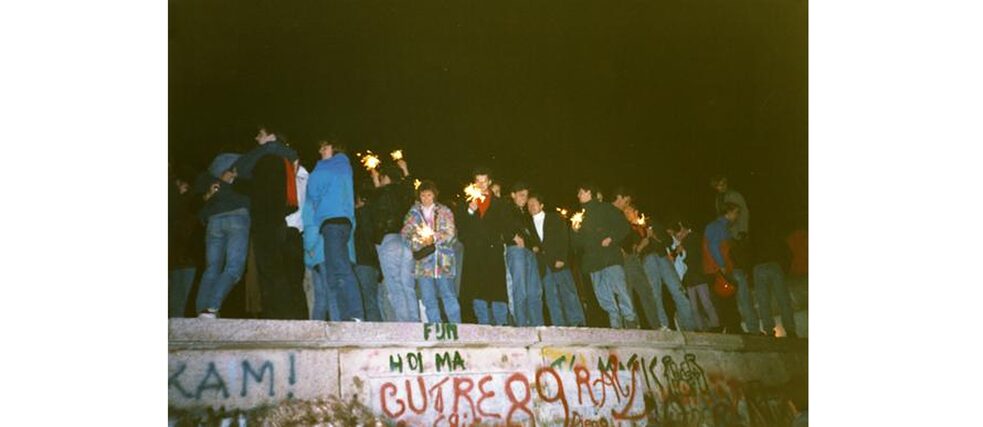Chapter 4
With immediate effect

"Up until the end I didn't believe the Wall would open," recalls Katharina Steinhäuser. "Friends from Bonn visited us once. When we were standing at the station, my little daughter said, "Next time we'll go there and visit them", and I replied, "That's never going to happen".
By Regine Hader and Dr. Andreas Ludwig
I'd never have thought that the Wall would come down - and it came down relatively quickly". She relates how central the desire for freedom was, for the possibility of travelling and speaking freely - and that most did not long for the end, but for a reform of the GDR.
"When does it take effect?" It feels like a query on the blackboard at school: the questions from journalists* seem to surprise Günther Schabowski, he answers awkwardly, perhaps even hopes that someone will whisper something to him after he has announced the new travel regulations. "To the best of my knowledge, it's immediately, immediately". By mistake, the Berlin SED leader declares the immediate fall of the Berlin Wall, a few minutes later the news spreads that the border is open!
The extreme tension of the past few days is discharging. Thousands of East Berliners are walking or getting into their cars to drive to the Wall. Uncertainty prevails here: on the one hand, the border has been declared open, on the other, the border officials are not informed. For the time being, the barriers remain down and the border is closed. Shortly after 9 p.m., the first GDR citizens are allowed to leave the country; the officials invalidate their passports and thus revoke their citizenship. "I am often asked why, as the daughter of a pastor, I did not simply apply for an exit visa. But I would have had to leave my family behind. We didn't even consider that the state would dissolve, but simply wanted to drive over, make a trip and be allowed to come back again." The stamps in the passports reflect this collective fear of expatriation, which Katharina Steinhäuser will continue to feel for a long time to come. "To me, going to Thuringia and seeing the border post or hearing someone criticise a politician is still something special. At such moments, I still lower my voice and don't know if I can really trust its being possible now"."We're flooding now", reports the commandant in charge of the border control at Bornholmer Straße at 23:30 and is the first to open the crossing completely - the stamps lie idle, the people stream across the border. "It was just a feeling of liberation - this jubilation - it was almost impossible to forget. I still get goose bumps when I think about it and see the pictures from back then on television", the eyewitness recalls.
 On the border: Brandenburg Gate, Berlin 10 November 1989
| Photo: Monika Waack © wir-waren-so-frei.de
On Berlin's night-time streets, relief and euphoria mix with curiosity and the feeling that something impossible has happened. At midnight all border crossings in the city area are open. The atmosphere is exuberant and boisterous, pubs serve free beer, people from East and West euphorically embrace each other, applaud each other, help each other on the masonry that separated them for decades, and dance. They are the giddiest images of that time. Despite all the problems that will come later, they still shape the narrative of unity today.
On the border: Brandenburg Gate, Berlin 10 November 1989
| Photo: Monika Waack © wir-waren-so-frei.de
On Berlin's night-time streets, relief and euphoria mix with curiosity and the feeling that something impossible has happened. At midnight all border crossings in the city area are open. The atmosphere is exuberant and boisterous, pubs serve free beer, people from East and West euphorically embrace each other, applaud each other, help each other on the masonry that separated them for decades, and dance. They are the giddiest images of that time. Despite all the problems that will come later, they still shape the narrative of unity today.
 On the Wall at the Brandenburg Gate: Berlin, 10 November 1989
| Photo: Hartmut Kieselbach © wir-waren-so-frei.de
A contemporary witness photographing the relaxed people at the Wall remembers: "And when my eyes got used to the darkness, I noticed the Vopos [People's Police] in their dark green uniforms. They stood motionless along the Wall at a distance of two arm's lengths, like wax figures, and seemed to be observing us. What a contrast".
On the Wall at the Brandenburg Gate: Berlin, 10 November 1989
| Photo: Hartmut Kieselbach © wir-waren-so-frei.de
A contemporary witness photographing the relaxed people at the Wall remembers: "And when my eyes got used to the darkness, I noticed the Vopos [People's Police] in their dark green uniforms. They stood motionless along the Wall at a distance of two arm's lengths, like wax figures, and seemed to be observing us. What a contrast".
Read on in chapter 5